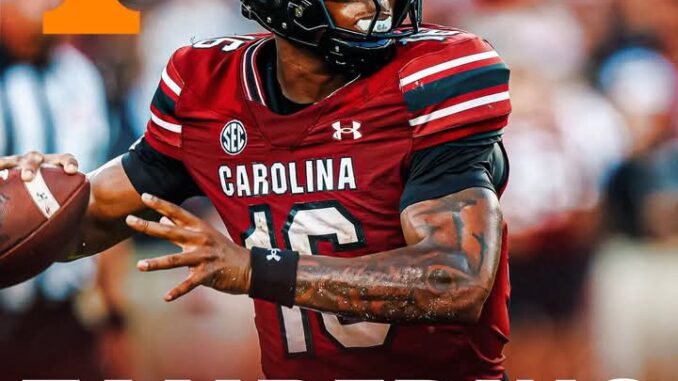
Gamecock Grit and Loyalty Triumph Over Millions: South Carolina QB LaNoris Sellers Rejects Tennessee’s $4.7 Million NIL Tampering Attempt, Choosing Loyalty Over Lucre in Unprecedented College Football Stand
**Columbia, SC** – In a dramatic display of loyalty and unwavering commitment, South Carolina Gamecocks quarterback LaNoris Sellers has publicly rejected a staggering $4.7 million Name, Image, and Likeness (NIL) offer from the University of Tennessee, an offer that aimed to lure him into the NCAA transfer portal. This unprecedented event has sent shockwaves through the college football landscape, highlighting the complex intersection of money, loyalty, and athletic ambition in the era of NIL deals. Sellers’ decision to remain in Columbia, turning his back on a sum doubling his current NIL value, marks a significant turning point in the evolving narrative of college sports.
The news, confirmed by multiple sources close to the Gamecocks program and later corroborated by Sellers’ own statement via social media, details a brazen attempt by Tennessee to acquire the talented quarterback. Details surrounding the offer remain scarce, with many questions surrounding the legality of such a large and seemingly overt attempt to influence a player’s transfer decision. The sheer magnitude of the offer, however, has ignited a fierce debate surrounding ethical boundaries in college athletics, the influence of NIL deals on player decisions, and the potential for future tampering scandals.
Sellers, a rising junior known for his strong arm, impressive athleticism, and leadership on the field, has quickly become a fan favorite in Columbia. His decision to reject such a lucrative offer underscores his deep connection to the Gamecock program and his commitment to his teammates and coaches. His statement, released on social media, emphasized his desire to finish his collegiate career in South Carolina and contribute to the team’s success. “This wasn’t just about the money,” Sellers stated. “South Carolina is my home. My teammates are my brothers. I’m committed to this program, and the thought of leaving them wasn’t an option, regardless of the financial incentive.”
The potential implications of this event are far-reaching. The NCAA’s ongoing struggle to regulate NIL deals and prevent tampering has been thrown into sharp relief. While NIL deals are intended to allow student-athletes to profit from their own image and likeness, the Tennessee-Sellers situation raises serious concerns about the potential for wealthy programs to exploit the system, using exorbitant sums to lure players away from less financially powerful institutions. The NCAA is now faced with the difficult task of determining whether the offer constitutes an illegal tampering violation. Investigations are likely to follow, potentially setting a precedent for future cases and prompting a review of the existing NIL guidelines.
The situation also highlights the growing influence of NIL deals on the landscape of college football. Once confined to scholarship offers and the intangible value of playing for a prestigious program, the recruitment process is now heavily influenced by financial considerations. The potential for a lucrative NIL deal is becoming an increasingly significant factor in a player’s decision to transfer or remain at their current institution. This opens the door for a potential arms race among programs with deep pockets, potentially widening the existing gap between financially powerful and struggling athletic departments.
Legal experts are already weighing in on the legality of Tennessee’s actions. While the details remain unclear, the size of the offer alone raises serious questions about whether it falls within the bounds of the existing NIL regulations. Even if the offer was technically legal, the aggressive nature of the attempt to sway Sellers’ decision raises ethical concerns and questions about the spirit of fair play in college sports. The outcome of any potential investigation could significantly shape the future of NIL deals and the rules governing player transfers.
Beyond the legal and regulatory implications, the story of LaNoris Sellers is a testament to the enduring power of loyalty, team spirit, and the personal connection a player can have with his university and teammates. While the financial incentive was undoubtedly tempting, Sellers chose a path less traveled – one that prioritized personal values and team commitment over potentially life-changing wealth. His decision is a powerful reminder that in the world of big-money college sports, intangible values like loyalty and team spirit still hold significant weight. The story serves as a powerful counter-narrative to the often-cynical view of college athletics, reminding us that athletes are more than just commodities. They are individuals with personal values and aspirations that transcend financial gain. The impact of Sellers’ bold decision will be felt far beyond the field, shaping the discussions surrounding NIL deals, player loyalty, and the future of college football for years to come.
Leave a Reply